Tuesday, March 23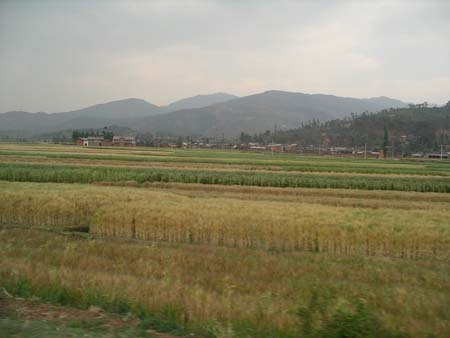
Paula and Steve: Today's plan called for more exploration of local villages and markets, this time in a mountain area populated primarily by people of the "Yi" ethnic group. Our final destination was the village of Weishan, about 35 miles (but over an hour and a half drive) from Dali.
The drive was lovely as we made our way up into the mountains passing small
villages along the way. Lee told us that these villages 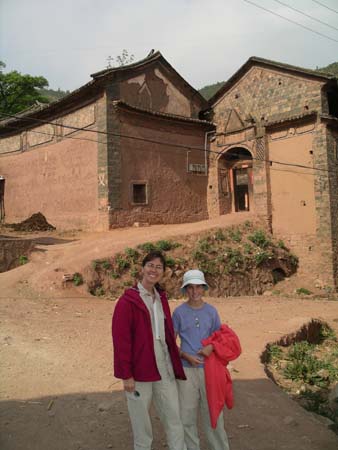 are
almost all occupied by the Yi ethnic group, and our first opportunity to see
the Yi people came in a small village that we passed on the road.. As we walked
down into the village, we were immediately confronted by groups of large (and
a little intimidating) barking dogs. Each household appears to own multiple
dogs, many with litters of pups. We happily
are
almost all occupied by the Yi ethnic group, and our first opportunity to see
the Yi people came in a small village that we passed on the road.. As we walked
down into the village, we were immediately confronted by groups of large (and
a little intimidating) barking dogs. Each household appears to own multiple
dogs, many with litters of pups. We happily 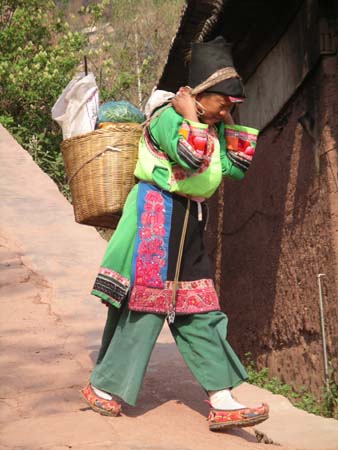 admired
the puppies until Lee informed us that the dogs were really not pets but instead
are raised for their meat. In fact, most people in China's countryside eat
dog meat - we just learned this today. Lee told us that if you eat too much
dog meat you get a bloody nose! Fortunately, cats here are in better standing
(although not as common) and we were pleased to see several plump and content
cats later in the day.
admired
the puppies until Lee informed us that the dogs were really not pets but instead
are raised for their meat. In fact, most people in China's countryside eat
dog meat - we just learned this today. Lee told us that if you eat too much
dog meat you get a bloody nose! Fortunately, cats here are in better standing
(although not as common) and we were pleased to see several plump and content
cats later in the day.
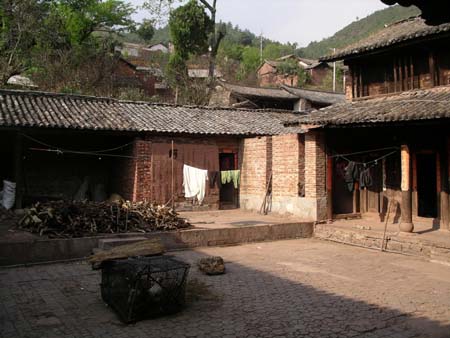 One
of the first things we noticed about the village was the construction of their
homes. Most of the houses are made of mud or clay and we could see where the
foundations were eroding because of water. The people of this village herd
livestock and farm on terraced plots. We saw several of the women in the village
in traditional dress - all beautifully embroidered in bright
One
of the first things we noticed about the village was the construction of their
homes. Most of the houses are made of mud or clay and we could see where the
foundations were eroding because of water. The people of this village herd
livestock and farm on terraced plots. We saw several of the women in the village
in traditional dress - all beautifully embroidered in bright 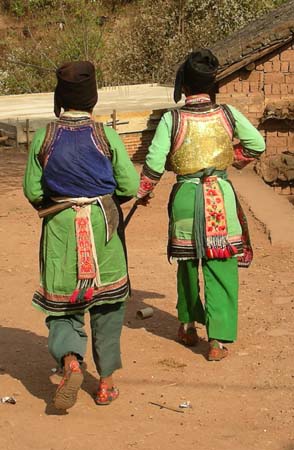 colors.
We were able to view one home where several families share a courtyard filled
with animals. The wood carved shutters are beautiful, though discolored from
the cooking which is done over an open fire inside the home. We realized that
the shutters were very similar to the antique one that we recently purchased
to bring home.
colors.
We were able to view one home where several families share a courtyard filled
with animals. The wood carved shutters are beautiful, though discolored from
the cooking which is done over an open fire inside the home. We realized that
the shutters were very similar to the antique one that we recently purchased
to bring home.
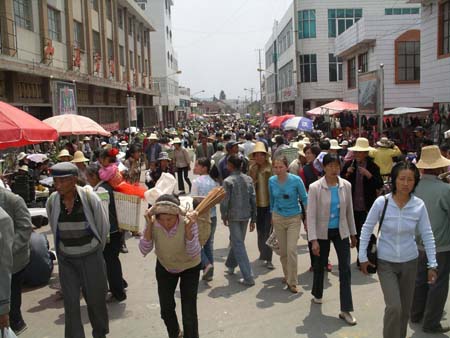 As
we continued our drive, we suddenly found ourselves in heavy traffic. The
road was crowded with horse-drawn carts all loaded with people and their market
purchases. It was clear that somewhere there was a very large market not to
be missed, and Lee got directions from someone passing by. This was a wonderful
local market, probably the largest we have seen anywhere. The main road was
absolutely packed with people as were the side streets crisscrossing back
and forth. We saw many different ethnic groups at this market - Bai, Yi, Han
As
we continued our drive, we suddenly found ourselves in heavy traffic. The
road was crowded with horse-drawn carts all loaded with people and their market
purchases. It was clear that somewhere there was a very large market not to
be missed, and Lee got directions from someone passing by. This was a wonderful
local market, probably the largest we have seen anywhere. The main road was
absolutely packed with people as were the side streets crisscrossing back
and forth. We saw many different ethnic groups at this market - Bai, Yi, Han
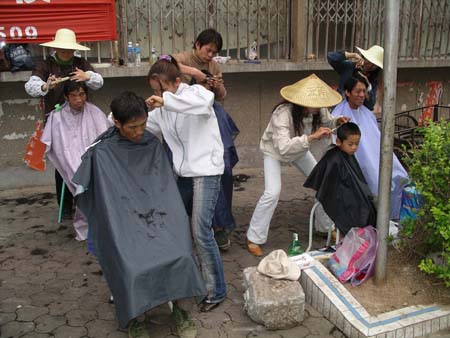 and Muslim. Along one of the main streets, people were lined up for haircuts
being given by "barbers in training." We had fun seeing a
and Muslim. Along one of the main streets, people were lined up for haircuts
being given by "barbers in training." We had fun seeing a 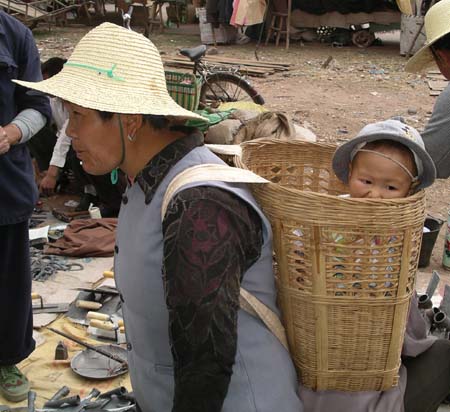 large
variety of animals for sale including rabbits and pigs. The kids had fun making
a few small purchases: a pipe used by all the older men and a "real horseshoe"
certain to be lucky!
large
variety of animals for sale including rabbits and pigs. The kids had fun making
a few small purchases: a pipe used by all the older men and a "real horseshoe"
certain to be lucky!
We were the only tourists in the market and the eyes of the locals followed
us wherever we went. Even our guide Lee commented on how we were being watched.
Several older gentlemen even tapped David on the shoulder and gave him the
thumbs up sign. 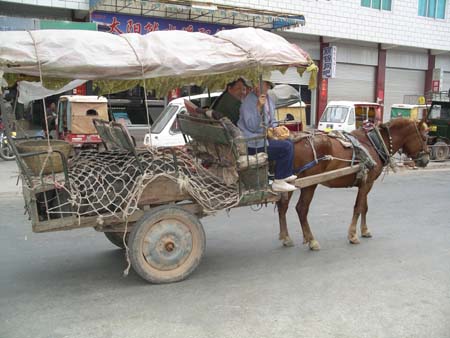
Before having lunch in the village, David and Katie tried their luck at a
ring toss game. They lost but the storekeeper insisted they take home a goldfish
he placed in a cup of water. After naming the goldfish, Mao (after Chairman
Mao of course), we quickly found him a home in the fish tank at a local restaurant
that we stopped at. Lunch was great, primarily because we were too far away
to eat in one of the "tou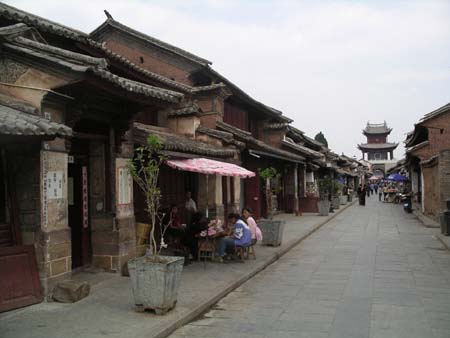 rist
restaurants." The local noodle soup has become one of our favorites and
is made with rice noodles. A special chili sauce can be added to make it extra
spicy. Lunch came to a grand total of $5.00, and included a pork dish, fried
corn, the
rist
restaurants." The local noodle soup has become one of our favorites and
is made with rice noodles. A special chili sauce can be added to make it extra
spicy. Lunch came to a grand total of $5.00, and included a pork dish, fried
corn, the 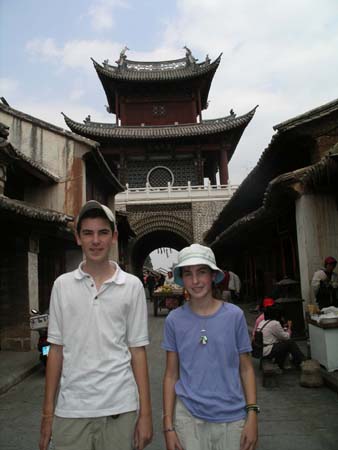 noodles,
rice, vegetables and drinks.
noodles,
rice, vegetables and drinks.
We also thoroughly enjoyed visiting the town of Weishan. This was once the
capital of the region and retains the charm of Dali without the hoards of
tourists. The main street of the town is lined with beautiful old homes and
shops. Each has beautifully carved wooden shutters and the traditional Chinese
roof. The people here were very friendly, many saying hello to us as we walked
along. 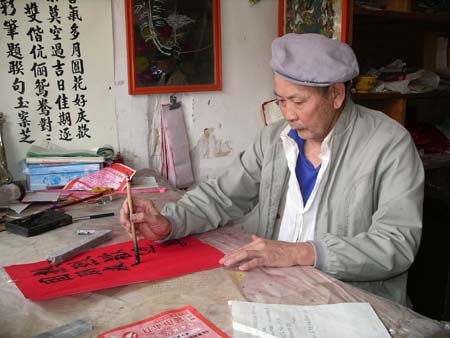
Katie spotted a shop selling spring couplets or "chuliens." These
are red banners with hand-painted Chinese sayings that are displayed around
a home's doorframe to welcome spring. At the request of a friend, we had been
looking (unsuccessfully) everywhere for these - it's the wrong season. Today
Katie 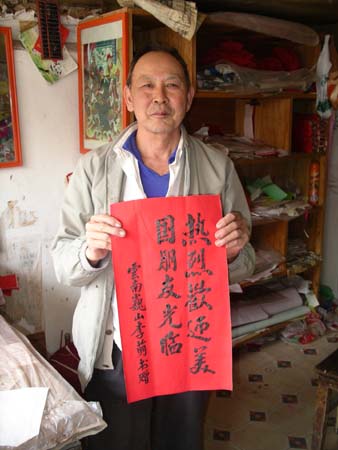 was
proud to spot some in the back of a small shop whose owner was sitting behind
a large desk writing Chinese characters on banners. After speaking with the
man, he went back into his storage closet and found as many of these couplets
(all left over from this year and being stored until next spring). We purchased
as many as we could to bring home. He was quite surprised and pleased with
our purchase and insisted on making us a personalized banner before we left.
The banner reads, "A warm welcome to our American friends who visited
here." He signed it with his name, Mr. Lee Meng and the name of the town
and province. We love it and can't wait to find a special spot for it at home.
was
proud to spot some in the back of a small shop whose owner was sitting behind
a large desk writing Chinese characters on banners. After speaking with the
man, he went back into his storage closet and found as many of these couplets
(all left over from this year and being stored until next spring). We purchased
as many as we could to bring home. He was quite surprised and pleased with
our purchase and insisted on making us a personalized banner before we left.
The banner reads, "A warm welcome to our American friends who visited
here." He signed it with his name, Mr. Lee Meng and the name of the town
and province. We love it and can't wait to find a special spot for it at home.
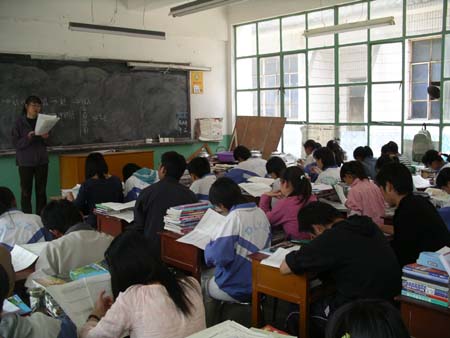 After
winding our way back to Dali, Lee offered to take us to the local middle school.
The school has about 800 students from grades 7-12. We were surprised by the
large number of students in each classroom - easily 50-60. Lee told us this
was normal. We also learned that all students board at school starting at
this age because the government feels this is the best way to make sure that
kids study hard and stay out of trouble. Lee seemed surprised that this wasn't
the norm in the U.S. Chinese students also study English for at least four
years and must pass difficult examinations in several subjects in order to
apply for the university. Admission is extremely competitive, and the students
feel tremendous pressure - only 25% of students are accepted at the university
level. Apparently the government can't afford to build new universities (that's
what Lee told us). We wondered whether this is at all used as a means to intentionally
limit the number of college-educated people here. Also, it appears that there
would not be enough professional jobs available if larger number of people
graduated from universities.
After
winding our way back to Dali, Lee offered to take us to the local middle school.
The school has about 800 students from grades 7-12. We were surprised by the
large number of students in each classroom - easily 50-60. Lee told us this
was normal. We also learned that all students board at school starting at
this age because the government feels this is the best way to make sure that
kids study hard and stay out of trouble. Lee seemed surprised that this wasn't
the norm in the U.S. Chinese students also study English for at least four
years and must pass difficult examinations in several subjects in order to
apply for the university. Admission is extremely competitive, and the students
feel tremendous pressure - only 25% of students are accepted at the university
level. Apparently the government can't afford to build new universities (that's
what Lee told us). We wondered whether this is at all used as a means to intentionally
limit the number of college-educated people here. Also, it appears that there
would not be enough professional jobs available if larger number of people
graduated from universities. 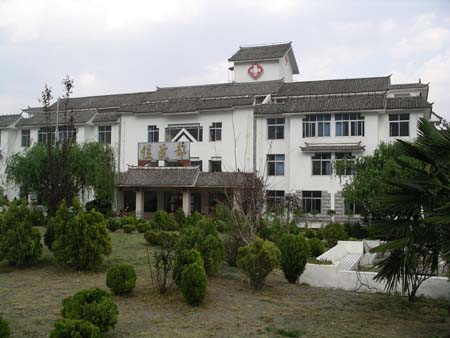
We also visited the public hospital in Dali. The hospital was better equipped,
cleaner and more modern than the facility we toured in Cambodia, but still
not the standard we take for granted in the U.S. We saw nurses all wearing
traditional caps. The rooms were crowded with 4-6 beds each and again with
no privacy. Families were expected to assist with ca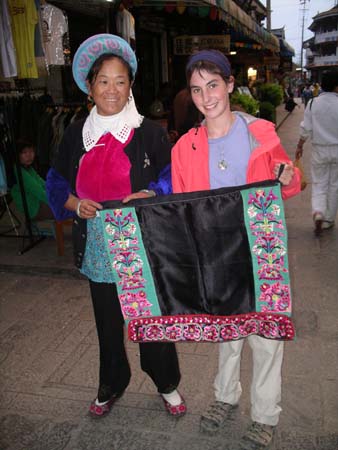 re
and meals. Lee told us that the SARS epidemic did not affect anyone in the
Yurran Province last year.
re
and meals. Lee told us that the SARS epidemic did not affect anyone in the
Yurran Province last year.
Finally we headed back to the shopping area in Dali for a few last purchases.
Katie wanted to buy a sample of the embroidery that is done here. We're going
to let her tell the story of how this process worked, but basically we put
here in charge of selecting what she wanted and also of negotiating the price.
What started as an asking price of 150 Yuan ended up as a purchase for 70
Yuan! Katie was VERY proud of herself. Then, while we were waiting for the
embroidery to be wrapped, she was offered a hair clip for 30 Yuan. Katie offered
to pay 10 Yu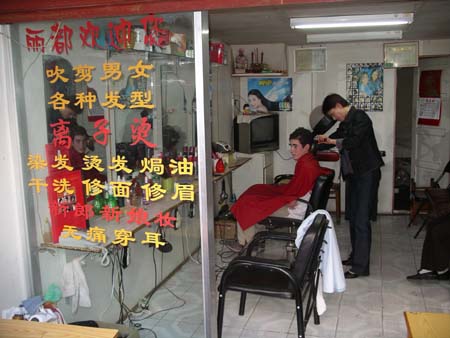 an,
and never budged! It was all very fun to watch, and even Katie admits how
far she has come in understanding the principles of negotiation. She remembers
her first and very negative reactions from when we were in Istanbul, and now
views this very differently. This will all be described in detail by Katie
in an upcoming journal entry…
an,
and never budged! It was all very fun to watch, and even Katie admits how
far she has come in understanding the principles of negotiation. She remembers
her first and very negative reactions from when we were in Istanbul, and now
views this very differently. This will all be described in detail by Katie
in an upcoming journal entry…
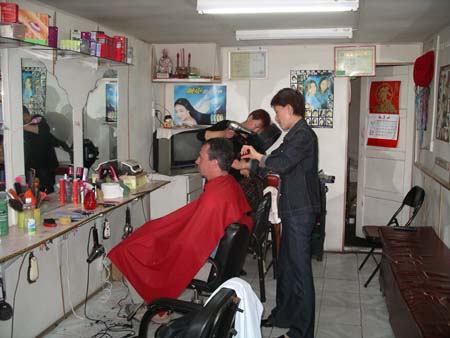 Before
dinner, Steve and David got haircuts in a small shop on the street in Dali.
A young woman smiled and greeted us warmly when we asked if we could get cuts,
and before we knew it we were sporting new shears - Chinese style! As always,
this is fun to do, especially trying to communicate how we want our hair to
be cut (usually an intersting task accomplished with hand signals…).
These will probably be the cheapest haircuts we'll ever have - $1.25 each!
Before
dinner, Steve and David got haircuts in a small shop on the street in Dali.
A young woman smiled and greeted us warmly when we asked if we could get cuts,
and before we knew it we were sporting new shears - Chinese style! As always,
this is fun to do, especially trying to communicate how we want our hair to
be cut (usually an intersting task accomplished with hand signals…).
These will probably be the cheapest haircuts we'll ever have - $1.25 each!
Tomorrow we'll be driving to Li Jiang, the next destination of our adventure in China.
